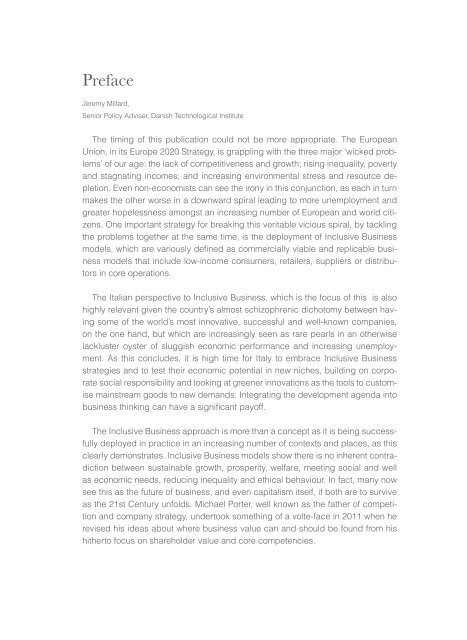INCLUSIVE BUSINESS
Create successful ePaper yourself
Turn your PDF publications into a flip-book with our unique Google optimized e-Paper software.
Preface<br />
Jeremy Millard,<br />
Senior Policy Adviser, Danish Technological Institute<br />
The timing of this publication could not be more appropriate. The European<br />
Union, in its Europe 2020 Strategy, is grappling with the three major ‘wicked problems’<br />
of our age: the lack of competitiveness and growth; rising inequality, poverty<br />
and stagnating incomes; and increasing environmental stress and resource depletion.<br />
Even non-economists can see the irony in this conjunction, as each in turn<br />
makes the other worse in a downward spiral leading to more unemployment and<br />
greater hopelessness amongst an increasing number of European and world citizens.<br />
One important strategy for breaking this veritable vicious spiral, by tackling<br />
the problems together at the same time, is the deployment of Inclusive Business<br />
models, which are variously defined as commercially viable and replicable business<br />
models that include low-income consumers, retailers, suppliers or distributors<br />
in core operations.<br />
The Italian perspective to Inclusive Business, which is the focus of this is also<br />
highly relevant given the country’s almost schizophrenic dichotomy between having<br />
some of the world’s most innovative, successful and well-known companies,<br />
on the one hand, but which are increasingly seen as rare pearls in an otherwise<br />
lackluster oyster of sluggish economic performance and increasing unemployment.<br />
As this concludes, it is high time for Italy to embrace Inclusive Business<br />
strategies and to test their economic potential in new niches, building on corporate<br />
social responsibility and looking at greener innovations as the tools to customise<br />
mainstream goods to new demands. Integrating the development agenda into<br />
business thinking can have a significant payoff.<br />
The Inclusive Business approach is more than a concept as it is being successfully<br />
deployed in practice in an increasing number of contexts and places, as this<br />
clearly demonstrates. Inclusive Business models show there is no inherent contradiction<br />
between sustainable growth, prosperity, welfare, meeting social and well<br />
as economic needs, reducing inequality and ethical behaviour. In fact, many now<br />
see this as the future of business, and even capitalism itself, if both are to survive<br />
as the 21st Century unfolds. Michael Porter, well known as the father of competition<br />
and company strategy, undertook something of a volte-face in 2011 when he<br />
revised his ideas about where business value can and should be found from his<br />
hitherto focus on shareholder value and core competencies.


